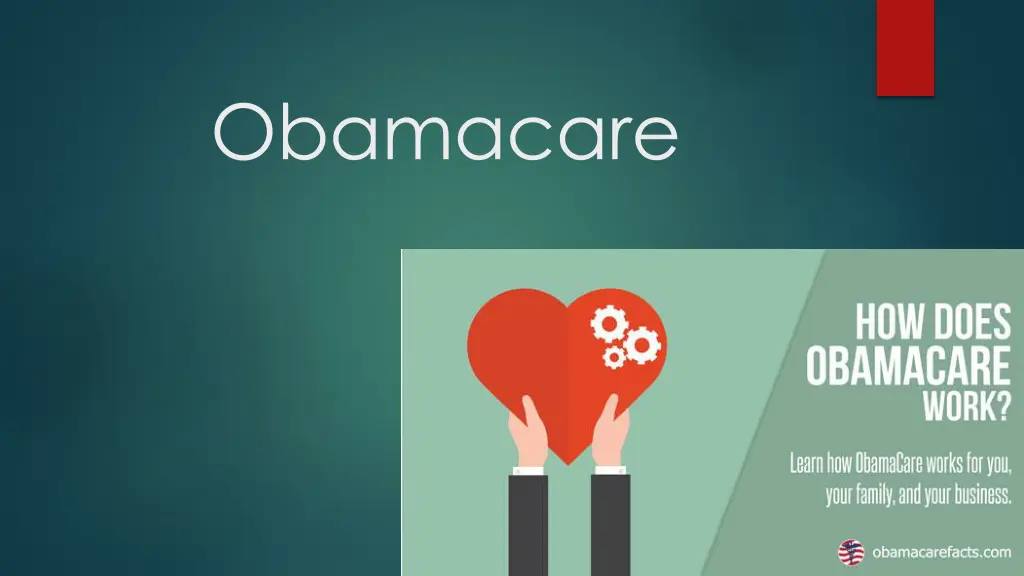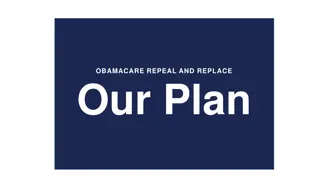
Understanding the Affordable Care Act (ACA)
Learn about the Patient Protection and Affordable Care Act (ACA), commonly known as Obamacare, which aims to provide healthcare to all. Discover when it took effect, its affordability, benefits, and the Health Insurance Marketplace plans it offers. Explore how the ACA prevents insurance companies from denying coverage, imposing rate hikes, and more to improve healthcare accessibility and quality.
Download Presentation

Please find below an Image/Link to download the presentation.
The content on the website is provided AS IS for your information and personal use only. It may not be sold, licensed, or shared on other websites without obtaining consent from the author. If you encounter any issues during the download, it is possible that the publisher has removed the file from their server.
You are allowed to download the files provided on this website for personal or commercial use, subject to the condition that they are used lawfully. All files are the property of their respective owners.
The content on the website is provided AS IS for your information and personal use only. It may not be sold, licensed, or shared on other websites without obtaining consent from the author.
E N D
Presentation Transcript
What is Obamacare? Patient Protection and Affordable Care Act (PPACA), or Affordable Care Act (ACA) for short. The goal is to provide health care to everyone!
The Affordable Care Act expands the affordability, quality, and availability of private and public health insurance through consumer protections, regulations, subsidies, taxes, insurance exchanges, and other reforms.
When did it go into effect? The ACA was signed into law to reform the health care industry by President Barack Obama on March 23, 2010 and upheld by the Supreme Court on June 28, 2012.
How affordable is it? In 2015: 1 in 6 Americans got a Health Insurance Marketplace plan for $100 or less (a month), and 87% of people who selected a marketplace plan got financial assistance. For 2016: 7 out of 10 returning Marketplace customers can get a plan for less than $75 a month, and 8 in 10 can get one for $100 or less.
Whats a Health Insurance Marketplace Plan? A resource where individuals, families, and small businesses can: learn about their health coverage options; compare health insurance plans based on costs, benefits, and other important features; choose a plan; and enroll in coverage
What are its benefits? Letting young adults stay on their parents plan until 26 Stopping insurance companies from denying you coverage or charging you more based on health status Stopping insurance companies from dropping you when you are sick or if you make an honest mistake on your application Preventing gender discrimination
Benefits continued Stopping insurance companies from imposing unjustified rate hikes Doing away with life-time and annual dollar limits Giving you the right to a rapid appeal of insurance company decisions Expanding coverage to tens of millions by subsidizing health insurance costs through the Health Insurance Marketplaces (HealthCare.Gov and the state-run Marketplaces)
More benefits Expanding Medicaid to millions in states that chose to expand the program Providing tax breaks to small businesses for offering health insurance to their employees Requiring large businesses to insure employees Requiring all insurers to cover people with pre-existing conditions
Even more benefits! Making CHIP easier for kids to get Improving Medicare for seniors Ensuring all plans cover minimum benefits like limits on cost sharing and ten essential benefits including free preventive care, OB-GYN services with no referrals, free birth control, and coverage for emergency room visits out-of-network
It all seems good so far. Whats the outcry over it? The Individual Mandate
What if I dont purchase health insurance? The per-person charge (i.e. fine) in 2016 jumps to $695 per adult and $347.50 per child, topping out at a whopping $2,085 per family. The income-based penalty rises to 2.5% in June of 2015.
Timeline of important dates associated with Obamacare: Feb. 2009- Obama says in a joint session to Congress, So let there be no doubt: Health care reform cannot wait, it must not wait, and it will not wait another year. July 2009-The Senate s Health, Education, Labor and Pensions Committee passes The Affordable Health Choice Act. The bipartisan bill included more than 160 Republican amendments accepted during the month-long mark up, one of the longest in history. August 2009- Obama travels to promote and gain support for the bill
Timeline of important dates associated with Obamacare: November 2009- The House of Representatives passes a version of the bill by a vote of 220-215 March 2010- The Senate passes its version of the bill sending it s legislation to Obama it is signed into law on March 23, 2010 January 2011-The House voted to repeal the law. That was largely symbolic since the Senate rejected the repeal. However, 22% of Americans thought the act had already been repealed August 2011- The 11thCircuit Court of Appeals rules that parts of the law are unconstitutional
Timeline of important dates associated with Obamacare: November 2011-The U.S. Court of Appeals in Washington rules that it IS constitutional November 2011- The Supreme Court agrees to hear a legal challenge to the law after 27 states, led by Florida, petitioned the high court March 2012- Three days of oral arguments begin at The Supreme Court over the constitutionality of the law June 28, 2012- The Supreme Court rules that the individual mandate of the health care law may be upheld within Congress power under the taxing clause
Obamacare Explained: http://useconomy.about.com/od/healthcarereform/a/Obamacare -Explained.htm https://www.youtube.com/watch?v=NshycmJoBOo
Discussion questions: (To be collected!) What countries provide some form of free, universal health care for their citizens? When did Obamacare get signed into law? When did it go into effect for citizens? Republicans objections to the Affordable Care Act include beliefs that the law will result in increased health care costs and lower-quality care. What is your take on these objections? Why are some everyday citizens opposed to the Affordable Care Act? What happens if you do not purchase health insurance?
What is the point of the article? What is a counter-argument that you can make for it? Is it biased or not? And why?


